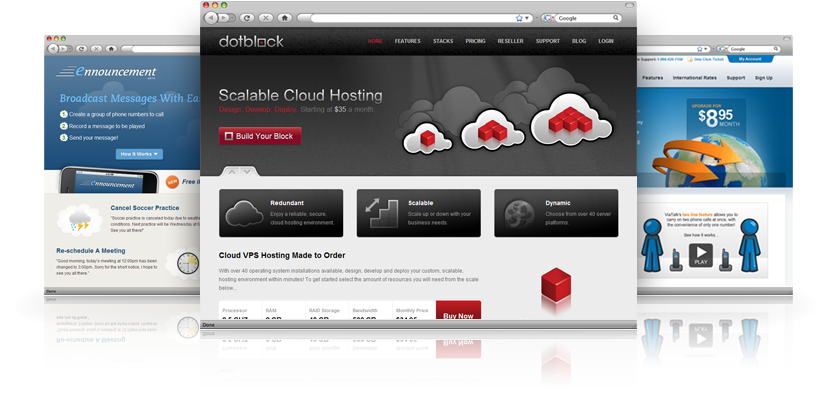Web design and hosting services are the foundation of any successful online presence. They work in tandem to create a seamless experience for your visitors, ensuring your website is not only visually appealing but also functional and accessible. Think of web design as the artistry of crafting a captivating online experience, while web hosting provides the platform and infrastructure to make it a reality.
From choosing the right domain name to selecting a reliable hosting provider, the process of building a website involves a series of strategic decisions. Understanding the interplay between web design and hosting is crucial to achieving your online goals, whether it’s driving traffic, boosting brand awareness, or generating leads.
Web Hosting Explained
Web hosting is an essential service that makes websites accessible to users around the world. When you create a website, you need a place to store all the files and data that make up your website, and this is where web hosting comes in. Web hosting providers offer space on their servers to store your website files, and they also provide the necessary software and infrastructure to make your website accessible to visitors.
Types of Web Hosting
Different types of web hosting cater to varying needs and resources. Choosing the right type depends on factors such as website traffic, budget, and technical expertise.
- Shared Hosting: This is the most affordable option, where multiple websites share the same server resources. It is suitable for small websites with low traffic.
- VPS Hosting: VPS hosting offers a virtualized server environment, providing more resources and control than shared hosting. It is ideal for websites with moderate traffic and specific software requirements.
- Dedicated Hosting: In dedicated hosting, an entire server is dedicated to a single website. This provides the highest level of performance, security, and control. It is suitable for large websites with high traffic and demanding applications.
Factors to Consider When Choosing a Web Hosting Provider
Several factors influence the decision of choosing a web hosting provider.
- Reliability and Uptime: A reliable hosting provider ensures your website is accessible to visitors 24/7. Look for providers with a high uptime guarantee.
- Performance and Speed: Website speed is crucial for user experience and search engine ranking. Choose a provider with fast servers and a robust infrastructure.
- Customer Support: Reliable customer support is essential for resolving technical issues and getting timely assistance. Look for providers with 24/7 support options.
- Security: Website security is paramount to protect your data and prevent malicious attacks. Choose a provider with robust security features like firewalls and malware protection.
- Scalability: As your website grows, you may need to scale your hosting plan. Choose a provider that offers flexible and scalable plans.
- Pricing and Features: Compare prices and features offered by different providers to find the best value for your needs.
The Relationship Between Web Design and Hosting: Web Design And Hosting Services
Web design and web hosting are two essential components of any online presence, and they work together seamlessly to create a functional and engaging website. The relationship between these two is symbiotic, meaning that each element relies on the other to succeed.
How Web Hosting Can Influence Website Performance and User Experience
The speed and reliability of a website are crucial for user engagement and satisfaction. Slow loading times, frequent downtime, and security vulnerabilities can all negatively impact a website’s performance and user experience. Web hosting plays a significant role in these aspects.
- Server Location and Network Infrastructure: The physical location of the server hosting a website can impact its speed and performance. Servers located closer to the target audience generally result in faster loading times. Additionally, a robust network infrastructure with high bandwidth and low latency is essential for smooth website performance.
- Server Resources: The amount of server resources allocated to a website, such as CPU power, RAM, and storage space, directly influences its performance. Websites with high traffic or demanding applications require more resources to operate efficiently. Choosing a hosting plan that provides adequate resources is essential for avoiding slowdowns and crashes.
- Security Measures: Web hosting providers offer various security measures to protect websites from attacks and data breaches. These measures include firewalls, malware scanning, and regular security updates. Choosing a hosting provider with robust security features is crucial for safeguarding sensitive data and maintaining user trust.
How Web Design Considerations Impact the Choice of Web Hosting Plan, Web design and hosting services
Web design choices influence the type of web hosting plan required for optimal performance. For example, a website with complex functionalities, such as e-commerce or a large database, will require a more powerful hosting plan than a simple static website.
- Website Complexity: Websites with dynamic content, multiple pages, or complex functionalities demand more server resources and a hosting plan that can handle the increased workload. For example, an e-commerce website with a shopping cart and payment processing features requires a more powerful hosting plan than a simple blog or portfolio website.
- Traffic Volume: The anticipated traffic volume to a website is another crucial factor in choosing a hosting plan. Websites with high traffic require a hosting plan that can handle the influx of visitors without experiencing slowdowns or downtime. Shared hosting plans, which share server resources with multiple websites, may not be suitable for high-traffic websites.
- Specific Features: Certain web design features, such as databases, scripting languages, and specific software applications, may require specialized hosting plans. For instance, a website using a content management system (CMS) like WordPress will require a hosting plan that supports the specific software and its requirements.
Closing Notes

In today’s digital landscape, having a well-designed and hosted website is no longer optional; it’s essential. By investing in quality web design and hosting services, you can create a website that not only stands out from the crowd but also helps you achieve your business objectives. The combination of captivating aesthetics, intuitive navigation, and reliable hosting ensures your online presence is both impactful and enduring.




